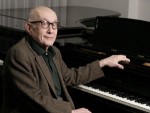Column Name
Title
On December 13, Jacob Lateiner, a Juilliard piano faculty member from 1966 to 2010, died at 82. Robert Taub (M.M. ’78, D.M.A. ’81, piano), recalls the teacher he studied with for 10 years, starting as a 15-year-old high school student.
Body
Jacob Lateiner was a fabulous teacher. Uncompromising in his artistic integrity, he made no distinction between performing and teaching; he inspired by infusing both with the highest ideals. His expectations of total musical commitment applied equally to himself and to his students.
When I first started studying with Jacob, he had me spend two summers learning the craft of finger/hand/wrist coordination: creating the illusion of legato, learning how to create a singing tone and exploring the limits of control of the piano. These coordination exercises had been handed down from his teacher (Isabella Vengerova) and her teacher before that (Theodor Leschetizky). The pianistic freedom they engendered was revelatory.
Later, Jacob strongly suggested that in addition to a broad spectrum of works of the standard literature, I should explore the music of living composers. He urged me to know why I played certain pieces, what they mean, why they were composed, what the composers were trying to achieve. “Why are you playing this piece?” he would ask. I had to have a good answer.
All lessons were performances, all repertoire played from memory. He instituted extra piano classes devoted to specific topics: slow movements of Beethoven piano sonatas, specific dance form movements from Bach suites. These were inspirational, as was his sharing of his autograph scores and first editions.
Treasured are the moments when he played the second piano part in rehearsing piano concertos, playfully imitating a bad orchestra with the idea that good orchestras are easy to play with. He forced his students to lead and to listen. Good experience.
His generous Chinese dinners for his piano class were legendary, and he was an unrivaled connoisseur; for him chefs always produced especially imaginative delicacies. “Order anything you want,” we would suggest. “Just don’t tell us what it is.” His connoisseurship extended to other civilized realms—single malts, Havana cigars, freshly roasted fine coffee.
Jacob did not wear the mantel of “artist” lightly. Surely there was the exhilaration of performing, the joy, the unbridled enthusiasm. But there was also the responsibility of being an artist: one’s interpretations and styles of playing are rooted in series of conscious decisions, which—when one is prepared—enable meaningful freedom and spontaneity on stage. Jacob’s goal as a teacher was to prepare his students to become independent, and thereby artists in their own right.
Scottish poet Robert Burns wrote, “O would some power the gift to give us/To see ourselves as others see us.” Musicians could change the verb “see” to “hear”—what a gift it would be to hear ourselves as others hear us. In order to develop a sense of how our music-making sounds—and to increase our interpretive sophistication and critical listening—we work with a teacher, a pedagogue in the old-fashioned sense of a master craftsman skilled in the art of interpreting black dots and from them, creating aural magic. For me, Jacob Lateiner was that magician, that artist, that teacher. My vivid memories of him will always suggest the highest standards to which an artist can aspire—the realization that good music is better than it can ever be played, and that it is our unending quest to forever try. To Jacob, and for that quest, I am eternally grateful.
Robert Taub studied with Jacob Lateiner from age 15 to 25, through high school, as a Princeton undergraduate, and as a Juilliard Diploma, M.M., and D.M.A. student.





